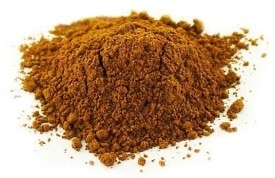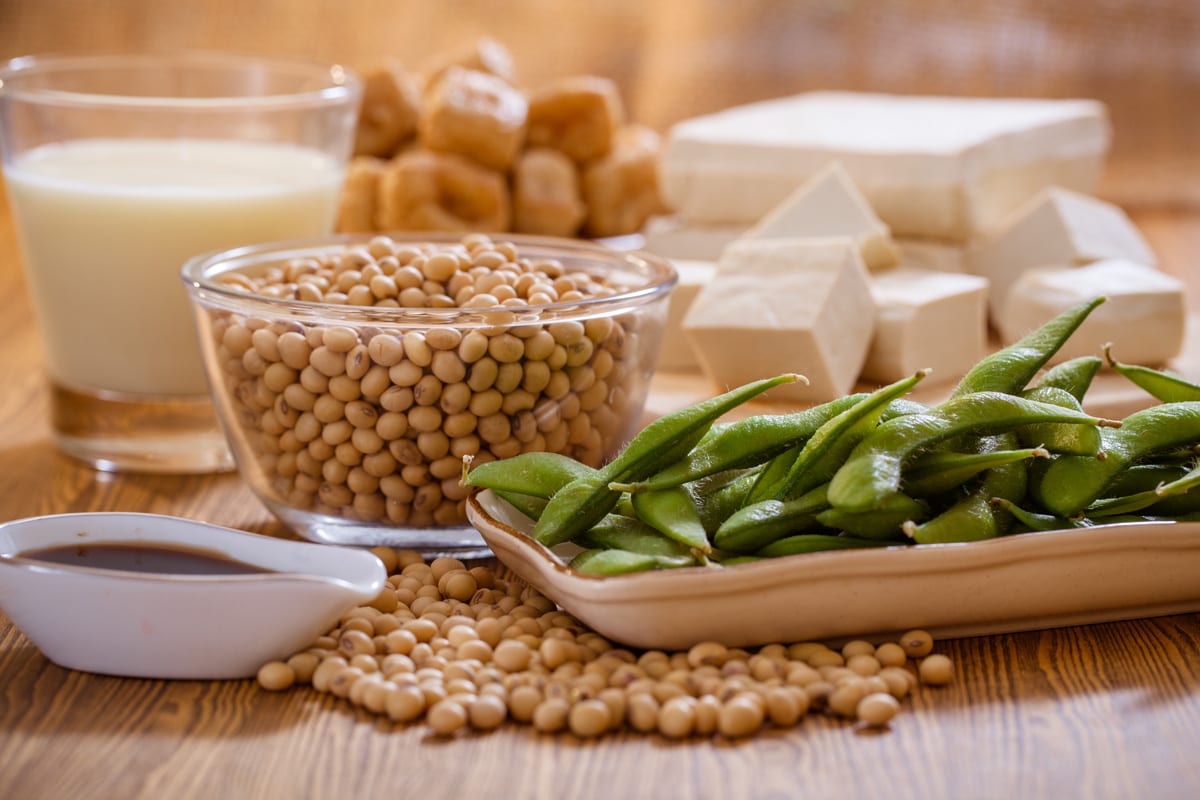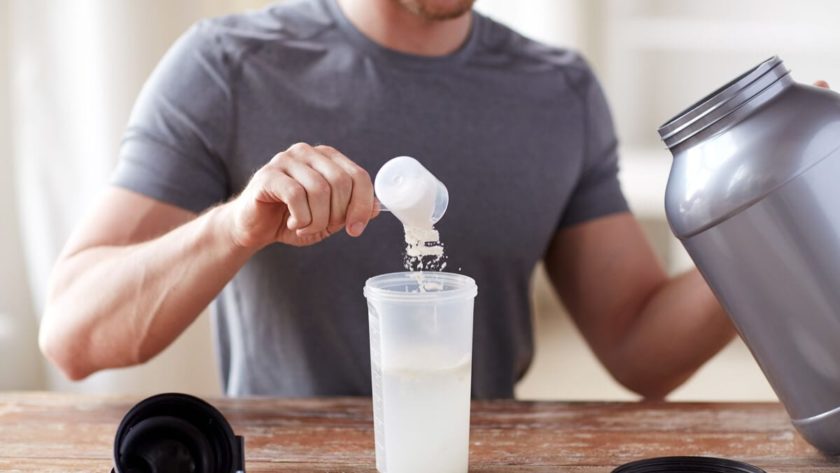Based on the seemingly endless aisles of protein powders on the market, it’s easy to assume Americans are woefully deficient in protein…

Many athletes and older adults supplement their diets with protein powders as an attempt to improve their bodies or as a convenient on-the-go meal. It seems simple enough, but is it really safe or necessary? I talked with Marty Gonzalez, KRON 4 Morning News Weekend anchor, about their safety and use.

What is Protein Powder?
Protein powder is a powdered form of protein that comes from:
- Milk (casein or whey protein)
- Eggs
- Plants (soybeans, peas, rice, potatoes, or hemp)
They also contain “fillers”, such as added sugars, artificial flavoring, thickeners, synthetic vitamins, and minerals. Protein ranges from 10 to 30 grams per scoop. (Supplements for body building contain more protein while those intended for weight loss contain less.)
Health Claims Make Billions
Protein powders are in high demand because they’re marketed to benefit weight loss, weigh gain, pregnancy, antioxidant defense, promote muscle growth, lower blood pressure, improve type 2 diabetes, reduce inflammation, enhance sports or sexual performance, etc. They’re readily available in fitness centers, gyms, health clubs, and grocery and nutrition stores and entice body builders, athletes, recreational users, and older adults/seniors.
According to a report by Research and Markets, the global protein supplements market size is expected to reach $21.5 billion by 2025. Plant-based protein (particularly pea) is expected to be the fastest-growing source segment in the market over the forecast period. Pea protein is expected to be the fastest-growing raw material segment in the market over the forecast period as it accommodates consumers allergic to dairy and eggs.
Are There Health Risks?
Here’s the most important thing you need to know about protein powders… They fall under the classification of dietary supplements. In 1994 President Clinton passed the Dietary Supplement Health and Education Act (DSHEA), so the FDA no longer regulates dietary supplements. Dietary supplement manufacturers are not required to get FDA approval BEFORE producing or selling dietary supplements.
It is only AFTER a dietary supplement reaches the market and is reported as a problem or safety hazard, such as illness or death, that the FDA has permission under DSHEA to take action (i.e., stop a company from making the supplement). But the FDA only takes action after they prove the product causes significant harm to the health of Americans, so the product can continue to be sold until then.
Since protein powders are NOT regulated by the FDA, manufacturers are NOT required to prove that:
- They are safe. Manufacturers are not required to test their ingredients before selling them.
- They work as advertised, OR
- Their packages contain what the labels say they do.
Dietary supplements are considered safe until proven unsafe.
It is up to the manufacturer to evaluate the safety, purity and potency of their own products and label them correctly. However, since there is no oversight for this process, manufacturers can make any claims about their products, such as advertise them as “male enhancers”.
In 2013, manufacturers ‘slipped in’ extra ingredients with little-known effects, such as “natural stimulants” that contained man-made drugs whereby several users died. Over the last decade, athletes have unknowingly taken banned substances due to consuming contaminated dietary supplements.
The Bottom Line: The long-term effects from consuming protein supplements are not known and the data on possible side effects is limited. Buyer beware… Just because it’s on the store shelf does not mean it’s safe.
The New Health Risk: Is It Real?
- In 2010, Consumer Reports detected arsenic, cadmium, lead, and/or mercury in 15 samples they tested.
- In 2013 44 herbal supplements sold in the US and Canada were sampled and analyzed. More than 52% did not contain any of the herb listed on the label.
- In early 2015, the New York Attorney General sent out warning letters to major retailers who sold supplements that were shown to be mislabeled.
- In early 2018, researchers from the Clean Label Project (a nonprofit that examines labeling safety issues) screened 134 of the top selling protein powders from 52 brands and detected heavy metals.
The Clean Label Project tested for 130 different types of toxin. They found that many protein powders contained the following heavy metals that have been linked to cancer, brain damage, and reproductive health issues:
- Lead – 70% had detectable levels; 75% of the plant-based samples contained lead
- Cadmium – 74% had detectable levels
- Bisphenol-A (BPA) – 55% had detectable levels (known to cause cancerous tumors, birth defects, and other developmental disorders)
- Arsenic
- Mercury
- Pesticides
- Other contaminants
One protein powder contained 25 times the allowed regulatory limit of BPA in just one serving (likely from packaging).
Consuming foods with these toxins can adversely affect your health over the course of your lifetime. In small amounts, these toxins are excreted in the urine. At higher levels, they can accumulate in your tissues, bone and blood, and linger there for many years.
Does “Detectable” Mean Dangerous?
Heavy metals are detectable in the foods we eat, but that does not necessarily mean they’re dangerous or do not meet “acceptable” levels. For example, lead is detectable in spinach. Arsenic is detectable in rice. Mercury is detectable in fish. Levels will vary based on how and where they’re grown/raised. Heavy metals get into our food supply because they’re in our air, soil and water which are absorbed by the plants or animals we eat.
The Clean Label Project published their blinded raw data and applied their own subjective “5 Star Rating” to the products for consumers, but they need to openly disclose their scientific research, so we know which findings are associated with which products.
Is “Organic” Better?
Based on the Clean Label Project studies, certified organic samples had 40% less BPA than non-organic, but have on average over twice the heavy metals:
- Arsenic – up to 1.5X more
- Cadmium – up to 4.8X more
- Lead – up to 1.5X more
The Bottom Line: Don’t assume organic is better when it comes to dietary supplements. Keep in mind that the organic standards are focused on pesticides not heavy metals or other contaminants.
Is Plant-Based Protein Better than Egg Protein?
Of those protein powders tested by the Clean Label Project, overall, protein powders that contained eggs as a protein source contained less contaminants than plant-based protein powders. This may be due to the animal absorbing some of the metals, so their milk or eggs used for the protein supplements contain less.
The Bottom Line: Don’t assume plant-based protein powders are better without doing your research.
Added Sugars and Calories
Protein powders generally don’t taste very good on their own, so manufacturers add sweeteners and artificial flavorings. Some protein powders contain as much as 23 grams of added sugar per scoop — that’s almost 6 teaspoons of sugar (the daily limit of added sugar for women). Depending on the protein powder, one serving in a glass of milk could end up being 1,200 calories. Remember, sugar is the ultimate “aging” food. See “Why Sugar Causes Wrinkles and Heart Disease“.
Consuming protein powders can result in weight gain from the added calories and unhealthy spikes in blood sugar. The body doesn’t need that much protein and excesses are stored as fat.
Usage and Serving Size
A serving size varied (e.g., 2 rounded scoops). Many consumers use protein supplements multiple times a day, so they could be consuming significant amounts of additional sugar, calories as well as heavy metals each day which accumulate in your tissues, bones, and blood.
Why They Contain So Many Contaminants
Contaminants come from the manufacturing processes or the toxins in soil (plant proteins). Again, whey (milk) and egg proteins had lower levels of toxins because it’s suspected that the animals absorb some of the toxins, so their milk and eggs contain less.
B eware of chocolate-flavored supplements. Some contain raw cacao. Cacao beans are handled by many hands. Cacao is usually sourced from fair trade communities in Central and South America that are poor and lack proper sanitary conditions. Raw cacao is minimally processed thus, protecting the flavanols, but it may contain toxic molds and undesirable pathogens since they aren’t treated with high temperatures.
eware of chocolate-flavored supplements. Some contain raw cacao. Cacao beans are handled by many hands. Cacao is usually sourced from fair trade communities in Central and South America that are poor and lack proper sanitary conditions. Raw cacao is minimally processed thus, protecting the flavanols, but it may contain toxic molds and undesirable pathogens since they aren’t treated with high temperatures.
Do You Need a Protein Powder?
The vast majority of people get plenty of protein from the foods they eat, but many Americans seem to think they’re deficient. However, it’s actually rare that people don’t get enough protein from the food they eat.
For example, a 160-pound individual needs about 55 to 95 gms of protein. The wide range is due to whether he/she is an athlete or older adult (over 65 years old). See “Is Too Much Protein Aging You?“.
- One cup of cooked soybeans (31 gms protein) + one cup lentils (18 gms protein) = 49 grams protein
- 3.5-oz chicken (31 gms protein) + 1 cup beans (15 gms protein) = 46 grams protein
- 1 cup Greek yogurt (17 gms protein) + 1 oz. almonds (6 gms protein) + 1 cup lentils (18 gms protein) + 1 egg (6 gms protein) = 47 gm protein

There are many natural ways to get sufficient protein without eating it in the form of a processed powder. Eat whole foods where you’ll benefit from all the other nutrients as well as the protein. Good protein sources include:
- Nuts and seeds
- Legumes (beans, peas, lentils)
- Fish, lean meat, poultry, eggs
- Low-fat dairy products
![]()
 Karen’s Fit Tip: The Clean Label Project has been under fire for their testing methods, results, and lack of peer review. But the point is, you cannot assume a protein powder is safe. Do your homework. Check the studies. Look for the NSF seal*.
Karen’s Fit Tip: The Clean Label Project has been under fire for their testing methods, results, and lack of peer review. But the point is, you cannot assume a protein powder is safe. Do your homework. Check the studies. Look for the NSF seal*.
*NSF International is an independent and accredited non-governmental organization that tests products for safety, potency and purity. NSF has created an app to quickly search for NSF-certified supplements. ALWAYS consult your physician before taking any protein or dietary supplement.
xo





